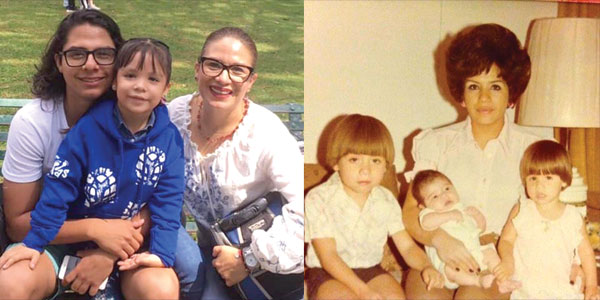
By Roberta Pardo
Breast cancer can be traumatic for the woman diagnosed with it. And for her family.
Nelly Gabriela Ramirez Sevilla knows first-hand how difficult it can be.
When Ramirez was 19, her mother was diagnosed with the most aggressive kind of breast cancer. The cancer was in the advanced stages. Her mother passed away within a year.
“It was a very painful, tiring process; it was really hard,” she said. “I was the only daughter – I have two brothers, but I was the only daughter – so (my mom) was my world.”
The aftermath was equally rough. Ramirez got depressed. She hated everyone. She started taking meds for depression and seeing a therapist.
“My pain was too strong,” Ramirez said.
Since then, the word “cancer” brings only thoughts of pain and trauma.
“Hearing the word gives me goosebumps,” Ramirez said.
Breast cancer is the second most common cancer in women, regardless of race or ethnicity, according to the U.S. Centers for Disease Control and Prevention. It is also the most common cause of death from cancer among Hispanic women.
Ramirez, who lives in Guadalajara, Jalisco, Mexico, is 46. Since her mother’s death, she has had a procedure to remove some cysts in her breasts, which has added to her trauma. Since then, she has undergone oncological checkups. She watches her diet and avoids eating certain foods to prevent the risk of getting cancer.
“I’m really scared,” she said. “I went to therapy and still do sometimes, and even more now. I’m 46 and feel like I’m fast approaching my mom’s age when she died.”
Her mother died at 49. Although it has been 26 years since then, the trauma is still there, Ramirez said.
“Subconsciously, it affects me a lot,” she said. “My kids are young, and I don’t want them to go through what I did.”
Ramirez remembers taking care of her mother. Her advice to others going through the same thing is to be patient with the person fighting cancer.
“Therapy is the best thing to deal with and overcome that situation,” she said. “A therapist will help you understand what’s going on.”
Because of how quick her mother’s cancer developed, Ramirez did not have the chance to go to therapy while it was happening.
“We weren’t ready for her to be sick, let alone for her death,” she said.
October is Breast Cancer Awareness Month. For more information about breast cancer, visit www.breastcancer.org or www.cancer.org, or contact your local hospital.
__________________________________________________________________________________________
Nelly Ramírez todavía tiene cicatrices de la batalla contra el cáncer de seno de su madre
El cáncer de seno puede ser traumático para la mujer diagnosticada. Y para su familia.
Nelly Gabriela Ramírez Sevilla sabe de primera mano lo difícil que puede ser.
Cuando Ramírez tenía 19 años, su madre fue diagnosticada con el tipo más agresivo de cáncer de seno. El cáncer estaba en las etapas avanzadas. Su madre falleció en un año.
“Fue un proceso muy doloroso, muy cansador; fue realmente muy difícil”, dijo. “Era la única hija, tengo dos hermanos pero era la única hija, así que (mi mamá) era mi mundo”.
Las consecuencias fueron igualmente duras. Ramírez se deprimió. Odiaba a todos. Comenzó a tomar medicamentos para la depresión y a ver a un terapeuta.
“Mi dolor era demasiado fuerte”, dijo Ramírez.
Desde entonces, la palabra “cáncer” sólo trae pensamientos de dolor y trauma.
“Escuchar la palabra me pone la piel de gallina”, dijo Ramírez.
El cáncer de mama es el segundo cáncer más común en las mujeres, independientemente de su raza o etnia, según los Centros para el Control y la Prevención de Enfermedades. También es la causa más común de muerte por cáncer entre las mujeres hispanas.
Ramírez, que vive en Guadalajara, Jalisco, México, tiene 46 años. Desde la muerte de su madre, se le ha realizado un procedimiento para extirpar algunos quistes en sus senos, lo que se ha sumado a su trauma. Desde entonces, se ha sometido a chequeos oncológicos. Ella observa su dieta y evita comer ciertos alimentos para prevenir el riesgo de contraer cáncer.
“Me da mucho miedo”, dijo. “Fui a terapia y todavía lo hago a veces, y aún más ahora. Tengo 46 años y siento que me estoy acercando rápidamente a la edad de mi madre cuando ella murió”.
Su madre murió a los 49 años. Aunque han pasado 26 años desde entonces, el trauma todavía está allí, dijo Ramírez.
“Inconscientemente, me afecta mucho”, dijo. “Mis hijos son pequeños y no quiero que pasen por lo que hice”.
Ramírez recuerda haber cuidado a su madre. Su consejo para otros que estén pasando por lo mismo es ser pacientes con la persona que lucha contra el cáncer.
“La terapia es lo mejor para enfrentar y superar esa situación”, dijo. “Un terapeuta lo ayudará a comprender lo que está sucediendo”.
Debido a lo rápido que se desarrolló el cáncer de su madre, Ramírez no tuvo la oportunidad de ir a terapia mientras sucedía.
“No estábamos listos para su enfermedad, y mucho menos para su muerte”, dijo.
Octubre es el mes de concientización sobre el cáncer de mama. Para obtener más información sobre el cáncer de seno, visite www.breastcancer.org o www.cancer.org, o comuníquese con su hospital local.









